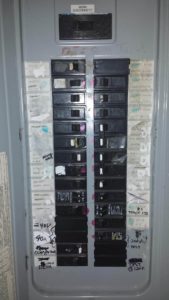.
DETECTING FISH ODORS IN YOUR HOME OR AC DUCTS???
People sometimes report detecting fishy odors or dead fish smells in their home. Fish odors in homes often remain a mystery for weeks, months, or even years. Eventually the mystery is solved and the cause of the fishy smell is understood.
- Sometimes the source is overheating electrical components that can be a serious fire hazard. This issue is the primary focus of this article. We discuss this possibility in more detail further down in this article. Therefore, it is very important for you to keep reading, it may save your property and your life!!!
- Other times the source may be mold in the AC unit. Mold growing inside AC ducts or inside AC units does not produce a fish odor in many people’s opinion. However, some people perceive a moldy smell in the ducts and mistake it for a fish smell.
- Some People mistake rodent odors for fish odor, but this is not a true fish odor.
The True Source Revealed!
Though all the above scenarios do in fact cause unusual and foul odors that are sometimes mistaken for fish odors, they are all not the source or a true fish smell. Only one produces a true fish smell. Going down the wrong path when investigating such an issue can be very dangerous, if the cause of fish smell in your home is overheating electrical system components. The odor is not always caused by, but is often caused by an overheating electrical component such as an overheating light socket, outlet, or electrical breaker panel.
The Chemistry of Fish Odor Indoors

Typical breaker panel with bakelite breakers. Fish odors in homes can be caused by overheating breaker panels or other overheating electrical devices in the home. If you smell fish odor call an electrician. Sometimes mold smells a little like fish to some people so it may be mold.
Electrical breakers, outlets, light switches, sockets, and some other plastic type electrical components are made of Bakelite. Bakelite’s chemical name is polyoxybenzylmethyleneglycolanhydride (yes that is a real word I did not make that up). This was the first plastic made from synthetic materials. It is a very hard plastic created in 1907 by chemist Leo Baekeland and is useful because of it’s resistance to conducting electricity, and it’s resistance to overheating. This plastic is a type of phenol formaldehyde resin. Such substances are a synthetic polymer made from a mixture of formaldehyde and phenols. Though it has a high resistance to melting, it does have it’s limitations, it can overheat.
When the material overheats it releases amines. These amine chemicals are actually what produces that fish odor. It is interesting to note that it is not just a figment of our imaginations that this amine smells like dead fish. Amine is the chemical that causes fish odor in overheating electrical components, and trimethylamine a type of amine is the specific amine that is the cause of true dead fish odor from actual dead fish!
It takes a lot of heat to visually damage the bakelite plastic that breakers, light switches, and light sockets, are made of. As a result, much odor can be produced long before you notice any heat damage.
Why Do Mysterious Odors Often Disappear Then Reappear Minutes Or Hours Later?
1) Typically, the reason for fish odors in homes appearing and disappearing is because the overheating electrical component is eventually turned of and cools down and slowly the smell dissipates. When the power to the device is back on, it heats up again and the dead fish odor production starts up all over again.
2) Another common reason that fish odors, and other building odors sometimes appear and disappear is your AC system. If your AC return (filter area) is near the source of odor it will pull the odor into the AC system. The odor can then be distributed to other areas of the home. Air distribution via an AC unit may cause odor to be diluted and disappear, or it may cause it to be blown into your face and thus become more obvious. In such cases it seems to suddenly appear from nowhere.
Dead Fish Smell Case Study I
- In 2014 I did a mold and indoor air quality investigation for a homeowner complaining of dead animal odor. After inspecting the clients West Palm Beach home. I found that the odor was in fact a dead fish smell. It was coming from an overheating breaker mounted on the AC unit in her garage. The fish smell was being pulled from the breaker and into the interior of the AC unit that the breaker was mounted on. The AC ducts then carried the odor to the master bedroom on the other side of the home.
Dead Fish Odor Case Study II
- During an air quality investigation, I was hired to look for the source of fishy smells in a trailer home North of Vero Beach. The odors source (an overheating breaker panel) produced a constant stream of odor. However, the AC unit caused the fish odor to be more noticeable whenever the AC kicked on. The same odor would disappear when the AC was off. The AC did this because the AC return pulled the smelly air out of the nearby wall mounted breaker panel and distributed this odor to the rest of the property. When the AC was off the odor lingered in the and near the panel. In both the above cases I was able to confirm that the panel was overheating with an IR camera or laser thermometer. I recommended an electrician make the required repairs.
One other possibility is that some people mistake moldy odors in AC units for fish odors. If you detect fish odors blowing out of your ducts it may be overheating electrical components, or mold odors from your AC or ducts. If it appears this may be the problem have a non bias mold inspector check for mold in your ducts.
The smells may be due to something as simple as a fish jumping out of and dying behind your aquarium. Fish odors may also be due to mold in your ducts. It may be due to some other bizarre unexplained phenomena. When you detect fish smells please consider the fact that it may very well be the result of overheating plastic components in an electrical device.
What Do I Do Now?
Consult a licensed electrician immediately, it is best to obtain the services of an electrician who is certified in the use of infrared thermography. The reason for the use of an IR camera is that IR cameras can help track down heat sources. On most IR cameras the hotter a surface it the brighter red it appears on the cameras display screen. Hire an electrician you trust. You can have electricians verify the condition by showing you the screen and the temperature readings on it. You can also get more than one opinion. Unfortunately, most inspectors including electrical inspectors are not familiar with this condition, so you will have to be cautious when choosing someone to conduct such inspections.
If the source is electrical then corrective measures are of the upmost importance. Overheating electrical components are the number one cause of home house fires in America. When overheating electrical components are found to be the source of trouble then have any and all required repairs made. Repairs must be mase as soon as possible by a qualified licensed electrician. When the source of overheating is an electrical component you must keep this in mind. Keep in mind that similar components of a similar age may be in more than one location in the building. Consider the possibility that the other similar components may now, or in the near future overheat. Thus, you must act accordingly.
This information is provided by Daryl Watters of A Accredited Mold Inspection Service, Inc. We provide mold testing
and indoor air quality investigations in South Florida.
1-888-381-6651





